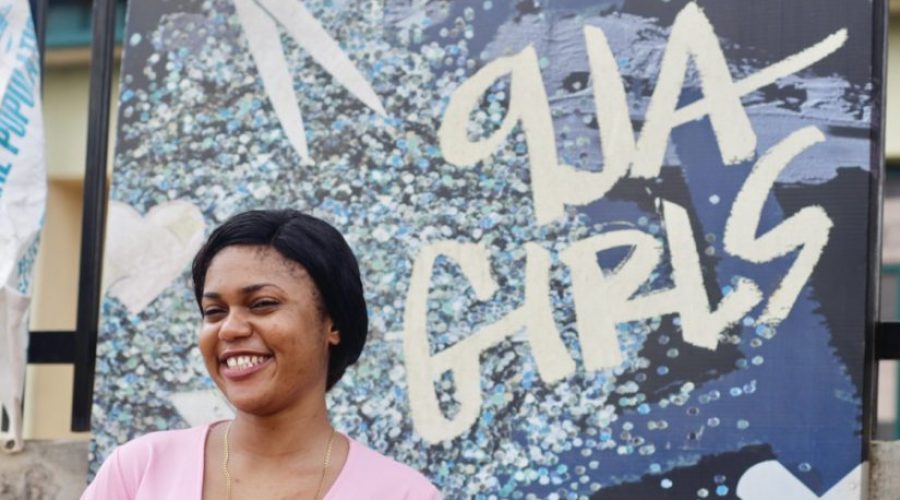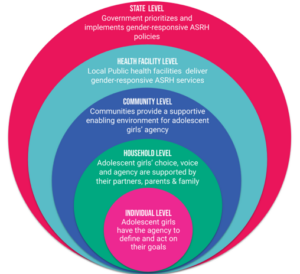By Emma Beck, Associate Communications Manager, PSI
Peace needed birth control. But she didn’t know where to go.
“I was scared,” she recalls. Peace didn’t feel comfortable going to the health clinic for fear of judgment, either from the provider on staff or from the adults waiting in the community’s health clinic.
After all, word in her community was that contraception was for promiscuous girls. Worse yet, Peace had heard that using a method could harm her ability to one day have a child.
The hospital was an option. But once she arrived, she remained acutely aware that no other young people were waiting to see a doctor. The provider she met with didn’t seem particularly welcoming. And, “no one talked to me about side effects.”
That was Peace at age 20.
Now, at 23, Peace is at the frontline in changing the system, ensuring no girl ever must question where to access the tools and how to ask the questions that shape their life decisions. Peace arranges a box of contraceptive options. Held within a wooden case, it has circular indents holding an array of options: IUDs, oral contraception, male condoms, female condoms and the like. A bold purple sticker with a 9ja Girls logo brands the lid; it’s a logo that girls not only recognize, but trust.
Peace, as a 9ja Girls provider, has been integral to making that happen. Across southern Nigeria, girls face deep socio-cultural challenges to accessing the SRH services and products they need to make their health and life choices. The repercussions are high; in southern Nigeria, 23 percent of girls have given birth by the age of 19.
According to the Demographic Health Survey, some three in 10 girls aged 15-19 want modern contraception but, for a myriad of reasons, don’t have access to it. And across the nation, one in four pregnancies among this age group will end in an abortion, many of which are unsafe.
In 19 months:
- 48,950+ girls aged 15- to 19-have voluntarily taken up a modern contraceptive method
- 7 in 10 girls who engage with 9ja Girls take up a method
- 1 in 4 choose a long-acting method
The insights that have driven our impact? We’ve got you covered. Just click below.
Adolescents 360 (A360)’s 9ja Girls – an adolescent and youth SRH program powered by PSI and implemented by the Society for Family Health— helps fill a critical gap in programming for young people within the public health system.
The project, which works alongside young people and in partnership with public health facilities, breaks down the misperceptions surrounding contraception and delivers girl-defined spaces for unmarried girls aged 15-19 to make their health and life choices on their own terms.9ja Girls trains youth-friendly providers like Peace to deliver contraceptive counseling to girls, tailored to what they say they want and need, right now.
Choice is Everything
“I use this Choice Book,” Peace flips through a spiraled booklet, pointing to large, sketched images of contraceptive methods. Bold headers followed by brief, clear descriptions detail each method – how they are inserted, how long they protect from pregnancy, how quickly fertility returns and what any potential side effects could be.
The Choice Book builds from girls’ insights. Girls expressed fear that contraception would harm their fertility and in response, counseling dropped all terms that focus on length (i.e. long-acting) in lieu of terms like “most effective.” Structured questions allow providers like Peace to understand what girls want in their lives: right now, in the next five years and into the future.
This is change that catalyzes impact. Since January 2018, 9ja Girls has worked in nine Nigerian states to serve more than 48,950 15- to 19-year-old girls like Taiwo with modern contraception. Roughly seven in 10 girls who engage with 9ja Girls voluntarily adopt a method, and about one in four choose a long-acting method.
A bedazzled privacy screen glimmers, positioned perfectly to ensure confidentiality as girls engage one-on-one with Peace. It catches the light, which reflects on the laminated 9ja Girls mantra—the same that girls sing as a cheer—pasted on the wall.
“My life is mine to make. My heart may break but I won’t fake, My body is mine, no one can take. I’m a 9ja Girl, I’m awake – HOORAY!”
Every detail put into the program, from the sessions, to the mantra, to the princess cut mirror hanging in the 9ja Girls’ waiting area and Peace’s very own gold sparkled shoes, root from what girls say they wanted to feel that the space was theirs, and that they were part of something bigger than themselves.
“I see girls holistically,” Peace says. “I understand who they are, and I do it without judgment.”
After all, Peace “can relate,” she says. She leans over her counseling table. “I want all girls to follow their dreams. I want them to be what they want in life. When it comes contraceptive counseling for young people, we know: choice is key, and leading with what matters to young people is integral to making contraception relevant, valuable and accessible to girls’ lives.
That’s why 9ja Girls embeds, youth-friendly providers to lead private contraceptive counseling. All contraceptive counseling addresses girls’ expressed concerns, including the potential for side effects and the assurance that all contraceptive methods are safe and reversible.
What have we learned – and what can you apply – about training youth-friendly providers? We’ve captured it all in the link below.




